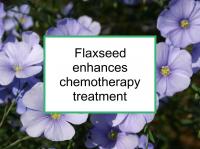Flaxseed is the richest known source of plant lignans (mainly secoisolariciresinol), which are converted by intestinal microbiota in the upper part of the colon to the mammalian lignans enterodiol and enterolactone. These mammalian lignans are also produced from whole rye, whole wheat, seeds, and a variety of fruits and vegetables.
Enterolactone and enterodiol are phytoestrogens. Both are structurally similar to estrogen but have antiestrogen activity: when they bind to cell receptors, they can decrease estrogen receptor positive (ER+) cell growth. However, it has been demonstrated that flaxseed can reduce the growth and proliferation of both ER- and ER+ breast cancer cells.
Enterolactone has been found to increase the sensitivity of breast cancer cells to radiation, thereby potentially enhancing the treatment effects of radiotherapy. High levels of enterolactone have been linked to reduced mortality among postmenopausal breast cancer patients. In addition to lignans, flaxseed also contains high levels of the omega-3 fatty acid alpha-linolenic acid, which has been shown to confer protection against breast cancer.
Flaxseed oil enhanced the effectiveness of Herceptin in reducing tumor growth in a mouse model of HER2+ breast cancer in one study. Now a new study has reported that flaxseed lignans increase the treatment effects of Adriamycin and Taxotere in triple negative (ER-/PR-/HER2-) and hormone receptor negative HER2 overexpressing (ER-/PR-/HER2+) breast cancer cells.
Flaxseed can be a source of harmful heavy metal exposure
While flaxseed has well-studied chemopreventive effects, it can be a source of heavy metal exposure. U.S.-grown flaxseed normally incorporates cadmium, a non-essential element that has been linked to increased breast cancer risk. This is not usually due to pollution, but a result of naturally occurring cadmium in the soil. The organic label does not necessarily mean "low cadmium." In addition, flaxseed grown in soil that formerly was used for flax fiber production (used to make linen) can be a source of exposure to herbicides, insecticides and other environmental contaminants.
Flaxseed also contains some copper, which should not be consumed by most women in excess of the recommended dietary allowance (RDA). Copper is essential in preventing anemia, but can promote tumor angiogenesis (blood vessel growth). Copper is also associated with increased cancer cell proliferation. Therefore, flaxseed should be purchased carefully and used in moderation. Flaxseed with low heavy metal content is grown in parts of northern Canada (some parts of Canada and the U.S. have high soil cadmium content). Flaxseed oil normally does not contain heavy metals and can be used more freely, however it is not a good source of lignans.
Latest research finds flaxseed lignans enhance chemotherapy
The study referenced above was designed to investigate the effects of combining flaxseed lignans (secoisolariciresinol and enterolactone) with the chemotherapeutic drugs Adriamycin (doxorubicin), Taxotere (docetaxel), and Paraplatin (carboplatin, which is not normally used for breast cancer). To conduct the study, the authors tested combinations of each of these drugs with and without flaxseed lignans in MDA-MB-231 triple negative and SKBR3 ER-/PR-/HER2+ breast cancer cells.
Flaxseed lignans were found to significantly increase the cytotoxic effects of all three chemotherapy drugs in both triple negative and HER2+ breast cancer cells. The authors also tested the addition of the antidiabetic drug metformin to the flaxseed lignan + chemotherapy treatments. Metformin has been shown to improve survival among breast cancer patients with type 2 diabetes. The combination of enterolactone and metformin was able to significantly reduce breast cancer cell viability while using relatively low concentrations of chemotherapy drugs (compared to using low concentrations of the individual chemotherapy drugs alone). The authors conclude that their results suggests further research in improving the treatment effects of chemotherapy by adjuvant therapy with the flaxseed lignans is warranted.
